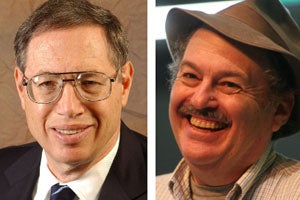In a talk sponsored by the HLS Tea Party, Harvard Professor Richard Freeman, faculty co-director of the Labor and Worklife Program at Harvard Law School, and Professor Richard Epstein of New York University School of Law, discussed the challenges facing unions today. The talk, “The Future of Unions in America,” was held at Harvard Law School on Feb. 13.
Epstein, a libertarian known for his research and writings on a broad range of constitutional, economic, historical, and philosophical subjects, offered an historical perspective on the decline of private sector unionization—from a peak of 35 percent of the economy in 1954 to about 7 percent today.
He outlined some of the areas where private sector unions exert their power, such as in free trade agreements and development. According to Epstein, these campaigns move far from traditional labor concerns and result in disruption. “The long-term economic dynamics of this system are very heavily against the expansion of unions,” he said.
On the public union side, said Epstein, the issue of retirement and pensions, where pensions are too costly to support, is one of the greatest challenges that unions face today.
”This creates the following kind of oddity, which is a movement that was essentially designed to talk about solidarity, ends up being a movement which talks about splits between incumbents and new entrants, so that essentially some of the privileges that are associated with the political classes in Washington now get carried over to unions.”
Freeman, the Herbert Ascherman Chair in Economics at Harvard University, said the demand for unionization will depend on workers: “I think we shouldn’t be starting so much with unions, we should be starting with workers and what workers want and what workers need in the society, because unions have not being doing a very good job of late.”
According to Freeman, in the future, it’s unlikely that workers will turn to collective bargaining to protect their needs and interests. If unions want to avert the decline in unionization, he said, they will need to look to a different form of organizing, using modern tools. He cited the recent successful petition by Bank of America customers to protest a proposed increase in debit card fees. “The Internet creates great opportunities for a smart, agile organization to try to rectify problems at workplaces and elsewhere,” he said.
Epstein is the James Parker Hall Distinguished Service Professor Emeritus of Law and Senior Lecturer at the University of Chicago Law School, and the Peter and Kirsten Bedford Senior Fellow at the Hoover Institution.
He is the author of several books, including “Takings: Private Property and the Power of Eminent Domain” (1985); “The Case Against the Employee Free Choice Act” (2009); “Supreme Neglect: How to Revive Constitutional Protection for Private Property (2008); “Antitrust Decrees in Theory and Practice: Why Less Is More” (2007) and “Overdose: How Excessive Government Regulation Stifles Pharmaceutical Innovation” (2006).
Freeman directs the National Bureau of Economic Research/Sloan Science Engineering Workforce Projects, and he is senior research fellow in labor markets at the London School of Economics’ Centre for Economic Performance.
Freeman’s publications include “What Unions Do” (1985);“Shared Capitalism at Work: Employee Ownership, Profit and Gain Sharing, and Broad-based Stock Options” (2010), “Reforming the Welfare State: Recovery and Beyond in Sweden” (2010) and “What Workers Say: Employee Voice in the Anglo American World” (2007). In 2007 he was awarded the IZA Prize in Labor Economics. His forthcoming book is “Making Europe Work: IZA Labor Economics Series.”
The HLS Tea Party was founded in 2011 by a group of Harvard Law School students to advocate for economic liberty in both legal theory and government policy. HLS Tea Party is unaffiliated with any national Tea Party groups or political parties.
